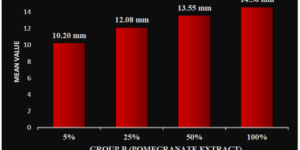Mohammed Muzammil Khan, Nagaveni NB, Afreen Kauser. Comparative evaluation of pomegranate, tulsi, garlic and liquorice extracts as an antimicrobial agent against Enterococcus faecalis – an in vitro study. Series Clin Med Case Rep Rev. 2025;3(4):1-8.
Background: Various irrigating solutions have been used during pulpectomy and root canal procedures. However, each one of them has its own demerits. As a result, there is a quest for novel bioactive materials that are safer and biodegradable.
Aim: To evaluate and compare the antimicrobial efficacy of pomegranate, tulsi, garlic, and liquorice as a root canal irrigant against Enterococcus faecalis.
Methodology: 0.2% chlorhexidine, pomegranate, tulsi, garlic, and liquorice extracts with different concentrations of 5%, 25%, 50%, 100% and fresh stains of Enterococcus faecalis (ATCC 29212) were used. The agar well diffusion method was performed to evaluate and compare the antibacterial efficiency of all the groups.
Results: The results were tabulated and statistically analyzed using analysis of variance (ANOVA). The mean zone of inhibition was highest for Group A (0.2% chlorhexidine), i.e., 18.36 mm, followed by Group E (liquorice extract), i.e., 17.40 mm, Group C (tulsi extract), i.e., 16.43 mm, and Group B (pomegranate extract), i.e., 14.55 mm.
Conclusion: All four herbal products (pomegranate, tulsi, liquorice, and garlic) possess antimicrobial activity against Enterococcus faecalis, with liquorice and tulsi extract having maximum effect, followed by pomegranate and garlic extract having minimum antimicrobial activity.

